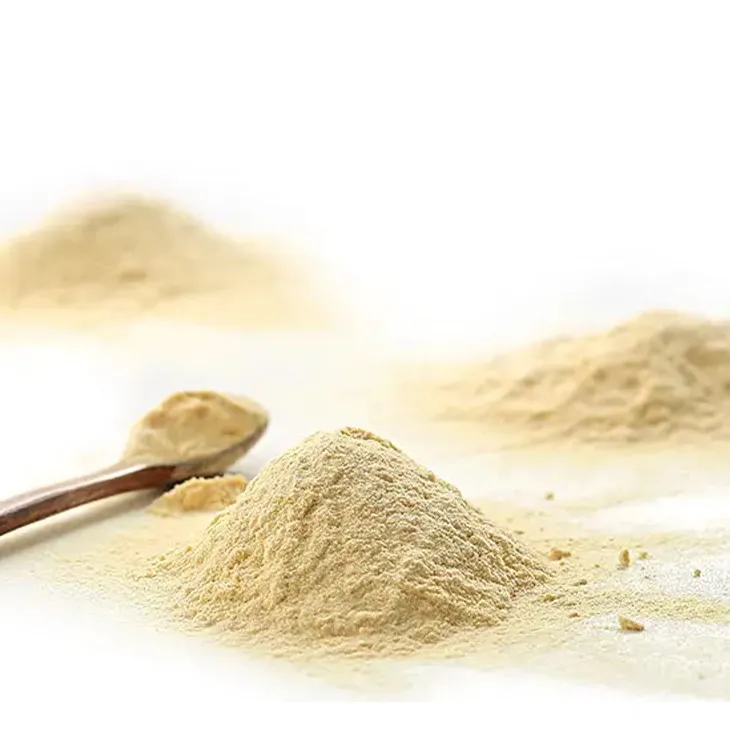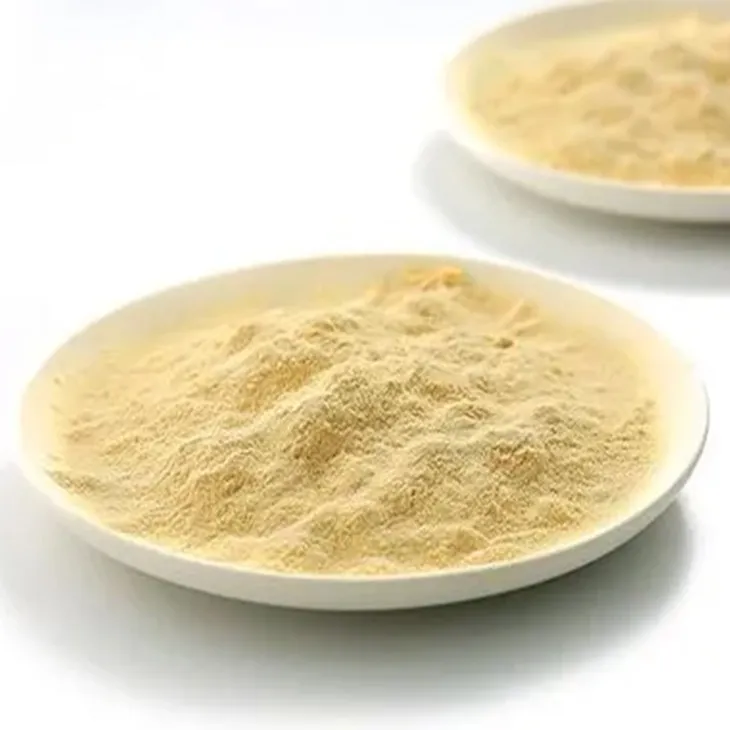- 0086-571-85302990
- sales@greenskybio.com
Five Efficacy of Selenium Yeast + Dosage and Side Effects.
2024-11-13

1. Introduction
Selenium is an essential trace element for human health, and Selenium yeast is a common form of selenium supplement. It has gained popularity due to its potential health benefits. In this article, we will explore the five main efficacy of Selenium yeast, as well as its proper dosage and possible side effects.

2. Efficacy of Selenium yeast
2.1 Antioxidant Properties
Selenium yeast is a powerful antioxidant. Antioxidants play a crucial role in protecting the body from damage caused by free radicals. Free radicals are unstable molecules that can damage cells, DNA, and proteins in the body. Selenium, as a part of antioxidant enzymes such as glutathione peroxidase, helps to neutralize these free radicals. This can reduce the risk of chronic diseases associated with oxidative stress, such as heart disease, cancer, and neurodegenerative diseases.
For example, in the case of heart disease, oxidative stress can damage the lining of blood vessels, leading to inflammation and the formation of plaques. By reducing oxidative stress, selenium yeast may help to maintain the health of blood vessels and reduce the risk of heart disease.
2.2 Immune System Support
Selenium is important for a healthy immune system. It helps in the proper functioning of immune cells, such as white blood cells. These cells are responsible for fighting off infections, viruses, and bacteria. Selenium yeast can enhance the immune response, making the body more resistant to diseases.
Studies have shown that selenium deficiency can lead to a weakened immune system. In some cases, supplementing with selenium yeast can improve immune function in individuals with low selenium levels. This is especially important for people who are at a higher risk of infections, such as the elderly or those with chronic diseases.
2.3 Thyroid Function Regulation
The thyroid gland is a vital endocrine gland that regulates metabolism. Selenium is necessary for the proper synthesis and function of thyroid hormones. Selenium yeast helps in the conversion of the inactive form of thyroid hormone (T4) to the active form (T3). This ensures that the thyroid gland functions optimally, which is important for maintaining a normal metabolism, body temperature, and energy levels.
In cases of selenium deficiency, thyroid function can be impaired. This can lead to symptoms such as fatigue, weight gain, and cold intolerance. Supplementing with selenium yeast may help to correct these thyroid - related issues in some individuals.
2.4 Anti - Inflammatory Effects
Chronic inflammation is associated with many diseases, including arthritis, diabetes, and certain cancers. Selenium yeast has anti - inflammatory properties. It can reduce the production of inflammatory mediators in the body, thereby alleviating inflammation.
For example, in arthritis patients, selenium yeast may help to reduce joint pain and swelling by decreasing the inflammatory response in the joints. This can improve the quality of life for those suffering from inflammatory conditions.
2.5 Cancer Prevention
There is evidence to suggest that selenium yeast may play a role in cancer prevention. It may act at multiple stages of cancer development, including inhibiting the initiation, promotion, and progression of cancer cells. The antioxidant and anti - inflammatory properties of selenium yeast may contribute to its cancer - preventive effects.
However, it should be noted that while selenium yeast may have potential in cancer prevention, it is not a substitute for other cancer prevention strategies such as a healthy diet, regular exercise, and not smoking.

3. Dosage of Selenium Yeast
The appropriate dosage of selenium yeast depends on various factors, such as age, sex, and individual health status. In general, the recommended dietary allowance (RDA) for selenium in adults is 55 micrograms per day for both men and women. However, some studies suggest that slightly higher doses may be beneficial for certain health conditions, but this should be done under the guidance of a healthcare provider.
For pregnant and lactating women, the RDA is slightly higher, at 60 - 70 micrograms per day, to support the needs of the developing fetus and breastfeeding infant.
When taking selenium yeast as a supplement, it is important to follow the instructions on the product label. Starting with a lower dose and gradually increasing if necessary is a cautious approach. Overdosing on selenium can be harmful, so it is crucial not to exceed the recommended limits.
4. Side Effects of Selenium Yeast
While selenium yeast is generally safe when taken within the recommended dosage range, there can be some potential side effects.
4.1 Gastrointestinal Disturbances
Some people may experience gastrointestinal side effects such as nausea, vomiting, diarrhea, or abdominal pain when taking selenium yeast. These symptoms are more likely to occur if the dosage is too high or if the individual has a sensitive stomach.
If these symptoms occur, it is advisable to stop taking the supplement and consult a healthcare provider. They may recommend adjusting the dosage or trying a different form of selenium supplement.
4.2 Selenium Toxicity
Taking very high doses of selenium yeast can lead to selenium toxicity. Symptoms of selenium toxicity include hair loss, brittle nails, skin rashes, garlic - like breath odor, and in severe cases, neurological problems. The tolerable upper intake level (UL) for selenium is 400 micrograms per day for adults. Exceeding this level for an extended period can be dangerous.
It is important to note that selenium toxicity is relatively rare when taking selenium yeast as a supplement, as long as the recommended dosage is followed.
5. Conclusion
Selenium yeast offers several potential health benefits, including antioxidant, immune - boosting, thyroid - regulating, anti - inflammatory, and possible cancer - preventive effects. However, it is important to take it in the appropriate dosage to avoid potential side effects. Before starting selenium yeast supplementation, it is advisable to consult a healthcare provider, especially for individuals with pre - existing health conditions or those taking other medications. By understanding the efficacy, dosage, and side effects of selenium yeast, individuals can make informed decisions about whether this supplement is right for them.
FAQ:
What are the five efficacy of Selenium Yeast?
Selenium Yeast has several important efficacies. Firstly, it is beneficial for antioxidant defense in the body. It helps in neutralizing harmful free radicals, which can reduce oxidative stress and protect cells from damage. Secondly, it plays a role in immune function. Adequate selenium levels can enhance the immune system's ability to fight off infections. Thirdly, it is important for thyroid health. Selenium is involved in the synthesis and metabolism of thyroid hormones. Fourthly, it may have a role in cardiovascular health. Some studies suggest that it can help in reducing the risk of certain cardiovascular diseases. Fifthly, it can contribute to male fertility as it is involved in sperm development and function.
What is the proper dosage of Selenium Yeast?
The proper dosage of Selenium Yeast can vary depending on factors such as age, gender, and specific health conditions. In general, for adults, the recommended dietary allowance (RDA) for selenium in the United States is about 55 micrograms per day. However, some supplements may contain higher amounts, usually up to 200 micrograms per day. It is important not to exceed the tolerable upper intake level (UL), which is 400 micrograms per day for adults, to avoid potential toxicity. Pregnant and lactating women may have slightly different requirements, and it is best to consult a healthcare provider for personalized advice.
What are the potential side effects of Selenium Yeast?
When taken within the appropriate dosage range, Selenium Yeast is generally safe. However, excessive intake can lead to side effects. High levels of selenium can cause selenosis, which may result in symptoms such as hair loss, nail brittleness, skin rashes, nausea, and diarrhea. In severe cases, it can also affect the nervous system and cause problems like tremors. People with pre - existing medical conditions, such as kidney problems, may be more sensitive to selenium and should be especially cautious when taking supplements.
Can Selenium Yeast interact with other medications?
Yes, Selenium Yeast can interact with certain medications. For example, it may interact with some chemotherapy drugs. Selenium has antioxidant properties, and there is a concern that it could interfere with the effectiveness of chemotherapy agents that work by generating oxidative stress to kill cancer cells. Also, it may interact with some anticoagulant medications. It is crucial to inform your healthcare provider about all the supplements and medications you are taking to avoid potential interactions.
Is Selenium Yeast suitable for vegetarians and vegans?
Yes, Selenium Yeast is a suitable source of selenium for vegetarians and vegans. Since it is a yeast - based product, it does not contain any animal - derived ingredients. It can be an important supplement for those following a plant - based diet to ensure they meet their selenium requirements, which may be more difficult to obtain solely from plant foods in some cases.
Related literature
- The Role of Selenium in Human Health"
- "Selenium Yeast: A Promising Source of Selenium and Its Health Benefits"
- "Dosage Considerations for Selenium Supplements in Different Populations"
- "Potential Side Effects of Excessive Selenium Intake"
- ▶ Hesperidin
- ▶ citrus bioflavonoids
- ▶ plant extract
- ▶ lycopene
- ▶ Diosmin
- ▶ Grape seed extract
- ▶ Sea buckthorn Juice Powder
- ▶ Beetroot powder
- ▶ Hops Extract
- ▶ Artichoke Extract
- ▶ Reishi mushroom extract
- ▶ Astaxanthin
- ▶ Green Tea Extract
- ▶ Curcumin Extract
- ▶ Horse Chestnut Extract
- ▶ Other Problems
- ▶ Boswellia Serrata Extract
- ▶ Resveratrol Extract
- ▶ Marigold Extract
- ▶ Grape Leaf Extract
- ▶ blog3
- ▶ Aminolevulinic acid
- ▶ Cranberry Extract
- ▶ Red Yeast Rice
- ▶ Red Wine Extract
-
Mulberry leaf Extract
2024-11-13
-
Gynostemma pentaphyllum extract
2024-11-13
-
Wheat Germ Extract
2024-11-13
-
Tamarind extract powder
2024-11-13
-
Buckthorn bark extract
2024-11-13
-
Tongkat Ali Extract Powder
2024-11-13
-
Red Wine Extract
2024-11-13
-
Oyster Mushroom Extract Powder
2024-11-13
-
Aguaje Extract
2024-11-13
-
Uridine-5'-monophosphate Disodium salt
2024-11-13





















